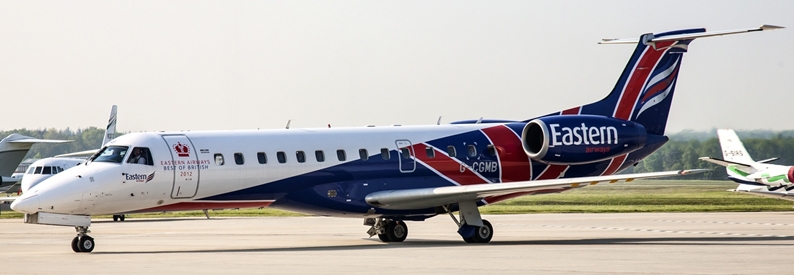Anglesey, UK only scheduled route under review

The Welsh government is reviewing a subsidised service between RAF Valley, the Royal Air Force (RAF) station on the island of Anglesey, and Cardiff, operated under a Public Service Obligation (PSO) by Eastern Airways (T3, Humberside).
North Wales Live quoted a Welsh government spokesperson as saying: “The service is currently suspended due to the impact of COVID-19. The future of the service remains under review.”
Eastern Airways was not immediately available to comment.
A Cardiff Airport spokesperson said the airport “remains open and available to facilitate the PSO service when the Welsh government is ready to restart it”. Cardiff Airport also manages the passenger terminal at Anglesey on behalf of the Welsh government. The facility has been upgraded to become National Aviation Security Programme (NASP) compliant by improving its security processes, which would be a stepping stone for Anglesey to receive bigger aircraft and, in future, no longer be reliant on PSO services, the spokesperson said.
According to the Anglesey airport website, the RAF used to allow up to two flights daily to operate out of Anglesey on weekdays. First introduced in 2007, Eastern Airways took over the subsidised route in March 2017, resulting in a 40% passenger growth. In 2019 they were awarded a PSO deal until February 2023 and there was talk of expanding route, but flights were halted due to the pandemic. In May 2021, Eastern Airways said flights were due to restart in the autumn but so far nothing has materialised.
In essence, the Anglesey-Cardiff PSO route is an example of the conundrum of government-funded routes versus environmental policy challenges. Governments such as Scotland and Wales have declared an environmental emergency, which may not square with the subsidization of air routes. North Wales Live reports that Welsh Conservatives have questioned the Anglesey route’s value in view of the GBP1 million pounds (USD1.3 million) a year it costs to subsidise, while the Welsh Liberal Democrats want the money to rather be spent on train services. Opposition politicians have also argued that the route was used to move civil servants and politicians backwards and forwards, but over the years it transpired that the general public was using it for their business and personal needs.
PSOs were suspended as part of the COVID-19 lockdown in the UK. The Welsh government has not lifted the suspension pending an increased demand for business travel. In addition, the government has been encouraging people to work from home if they can. Paying for a PSO service may be seen to be in conflict with government public policy, observers said, but pointed out that ironically, the government was paying for the nationalised train service and was subsidising the bus service in Wales.
Insiders said moves were afoot in the UK for PSO routes to be operated by aircraft using Sustainable Aviation Fuel (SAF), which would solve the conundrum.
A public service obligation route normally links a remote part of the country to a capital city. A PSO air route is justified if the journey by road or train is more than four hours and if there is no suitable public transport that takes less than four hours. The case of Anglesey and Cardiff is suitable as it takes about five hours by road and train (no direct link) and over mountains. The route has carried about 14,000 passengers per year, linking the north of Wales to the south of the country.
Meanwhile, Cardiff Airport confirmed Eastern Airways currently operates 4x weekly flights with an ATR72-600 based in Southampton via Cardiff to Belfast City, however, it would base an aircraft at Cardiff again from October 26 to operate flights from there to Belfast.
